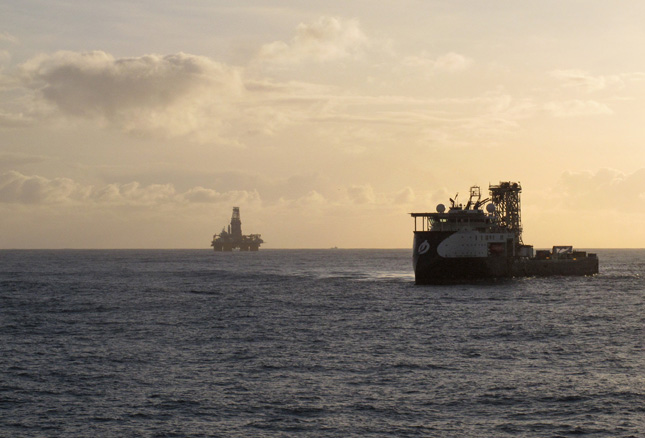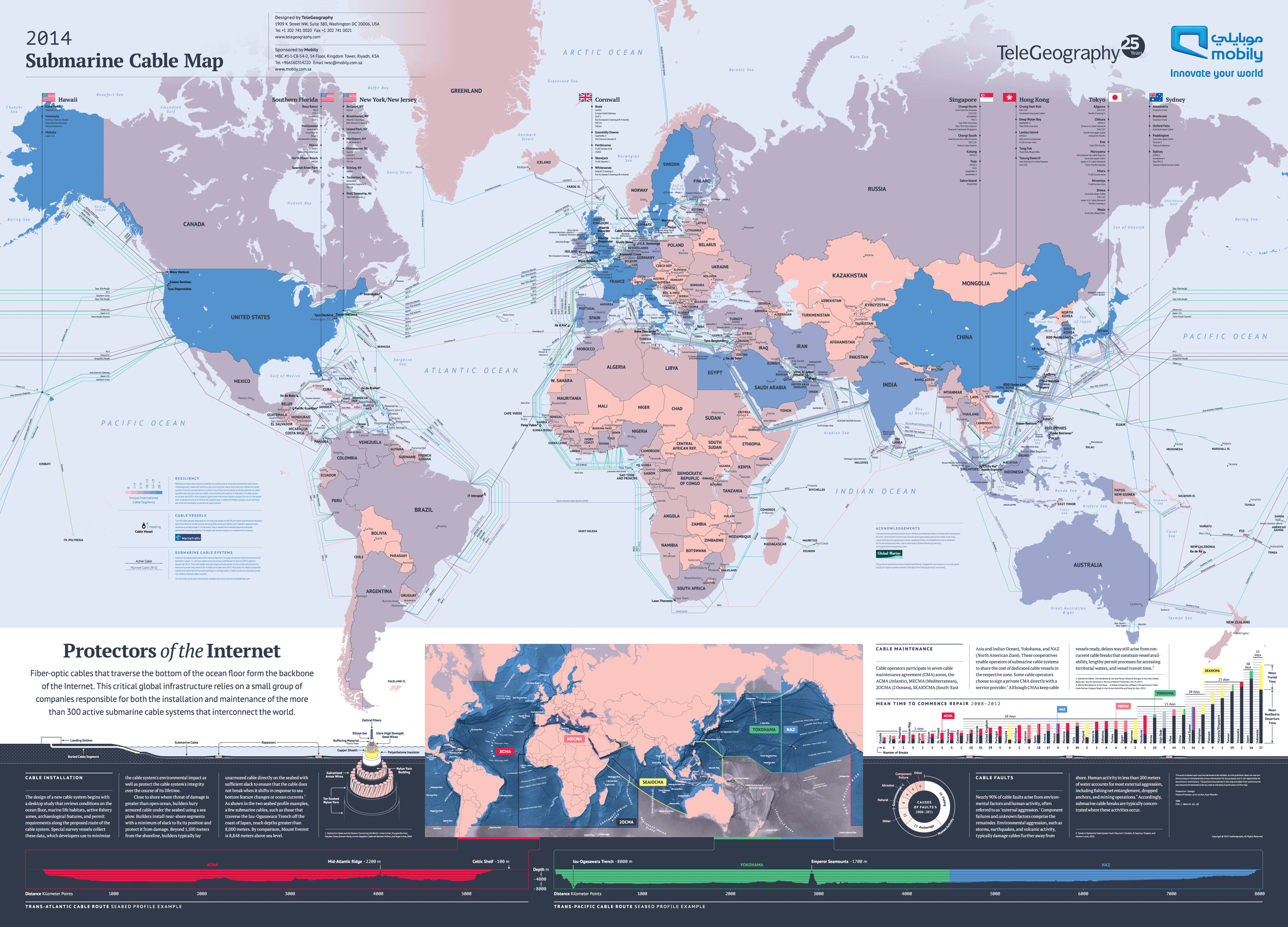-
Deep Trouble: Emerging Resource Competition in the Deep Sea

It might seem strange to say that the deep sea, the vast expanse of the world’s oceans beyond the continental shelf, is at risk of conflict and competition. After all, no one lives there, and as is often said, more is known about the surface of the moon than most parts of the ocean floor. But the fact is, even the cold, dark reaches of the ocean are no longer immune to resource competition between the world’s major powers.
A combination of technological advances, rising demand for fish and rare minerals, and an under-developed institutional framework make the deep sea the planet’s latest – and perhaps last – frontier for those concerned with preventing future conflict, we write in a recent issue of Global Environmental Politics.
A crucial feature of the deep sea is that very little is known about it. The region, typically defined as beyond the continental shelf break and below 200 meters in depth, is astoundingly diverse, encompassing towering underwater mountains, deep trenches, and vast undersea plains. Life in the deep sea is generally less abundant than closer to the surface, but it is unique. The pressure and temperature extremes to which deep sea organisms have adapted may inspire novel materials, pharmaceuticals, and other scientific discoveries. Tragically, we may never find out. Destructive fishing practices, like bottom-trawling, are affecting even some parts of the deep sea, devastating ecosystems before they can be studied. But perhaps the most important features of the deep sea from a security point of view are its geopolitical importance for military operations, communications, and minerals.
For all its remoteness, the deep sea is getting more crowdedFor decades, scientists have known that certain minerals which are often rare and difficult to extract on land are found in large concentrations on the sea floor. Manganese, an element essential to industry, can be found in clumps on the ocean floor, where in theory it could be simply scooped up by large machines. Although the logistical challenges of mining in the deep sea are daunting, the rewards can be substantial. Copper grades at the world’s first proposed commercial deep sea mining site, off Papua New Guinea, are estimated at 8 percent, compared to an average of 0.6 percent for terrestrial mines. Concentrations of gold are estimated to be three to five times higher underwater than on land. What’s more, deep sea mineral deposits tend to lie at a shallower depth than on land, simplifying some parts of the mining process, and, perhaps best of all, deep sea mining doesn’t require permanent infrastructure or interfere with other human activities. At least, not yet. For all its remoteness, the deep sea is getting more crowded, in part thanks to the internet.
Some 99 percent of global data traffic is carried by underwater cables, dozens of which snake across the world’s deep sea regions at depths of up to 8,000 meters. But just like on land, some deep sea real estate is more valuable than others. Cable-layers seek routes that avoid volcanoes, trenches, and other obstacles. Combined with the steady growth in the number of deep sea cables, this raises the prospect of cable-laying interfering with other resource extraction activities, especially mining, potentially leading to conflict between resource users.
If this seems too far-fetched, consider the possibility that states may intentionally sever cables to disrupt global communications. A pair of divers accomplished this in shallow water off Egypt in 2013, and it seems quite likely that some countries, especially Russia, are experimenting with the tactic using submarines in much deeper water. While the effect of such a disruption would not itself be catastrophic, it may be enough to help blind an adversary long enough to launch a debilitating armed strike.
The rules that govern the deep sea, such as they are, contribute in some ways to competition between countries seeking to exploit its riches. Under the United Nations Law of the Sea, the treaty that governs most of the world’s oceans, most of the deep sea is an “Area Beyond National Jurisdiction,” meaning no one is really in charge. Each country has a duty to regulate the activities of vessels that fly its flag, and there are some restrictions on fishing, pollution, and other potentially harmful actions on the high seas, but hardly anyone believes these are sufficient to cooperatively and sustainably manage deep sea resources.
China has come to see the deep sea as an area of strategic importanceThere is one major exception to this generally lawless picture. The deep seabed is managed by an international organization, the International Seabed Authority, based in Kingston, Jamaica, which grants licenses for mining operations and is supposed to use any revenues (there have been none so far) for the benefit of the world’s least-developed nations. Despite its considerable success in developing a governance framework for the world’s most inhospitable areas, however, many licenses have been snatched up by countries like China and Russia, both of which seem to seek geopolitical advantage in controlling deep sea territory. China, in particular, has come to see the deep sea as an area of strategic importance both for its economy and, one may presume, its military as well.
Indeed, deep sea exploration and prospecting can benefit countries’ defense establishments both by improving knowledge of the operating environment for deep-diving nuclear submarines and testing technologies that are well-adapted to temperature, pressure, and other extremes. Given this relevance, it’s perhaps not surprising that competition and conflict have become a feature of the world’s deepest regions.
Security policymakers in the United States and elsewhere do, of course, have plenty to worry about on dry land. But some relatively simple and low-cost investments could do much to alleviate the threat of competition and conflict in the deep sea. First, the Pentagon and other federal agencies that finance scientific research can increase financing opportunities for deep ocean research. Second, although the United States is not a party to the Law of the Sea convention, it can work with the United Nations and like-minded countries to improve governance of deep sea resources, especially protecting them from destructive practices like strip-mining and bottom-trawling which may lead to disputes. By taking these steps, the United States can help keep the world beneath the waves from being another source of conflict.
Scott Moore is a political scientist focused on environmental politics. He has served at the U.S. Department of State where his responsibilities included U.S.-China ocean cooperation.
Dale Squires, an economist focused on marine issues, is a senior scientist at the National Oceanic and Atmospheric Administration and adjunct professor of economics at the University of California San Diego. He works with the International Seabed Authority on the deep sea mining payment regime.
This article does not necessarily represent the views of the U.S. government.
Sources: Center for American Progress, Global Environmental Politics, IQ, Mental Floss, National Oceanography Center, NEC, NPR, PBS.
Photo Credit: Courtesy of flickr user Brendan Campbell. Map: TeleGeography.
Topics: China, consumption, cooperation, economics, Egypt, environment, environmental peacemaking, environmental security, featured, foreign policy, Guest Contributor, international environmental governance, military, minerals, natural resources, oceans, Papua New Guinea, protected areas, Russia, security, U.S., UN
 A Publication of the Stimson Center.
A Publication of the Stimson Center.




